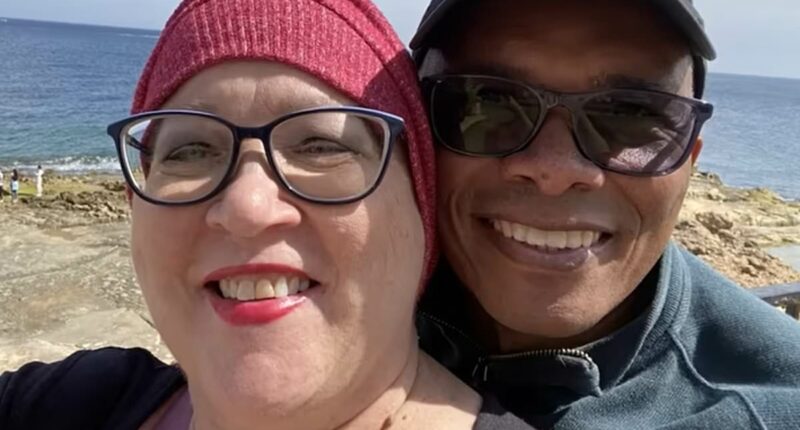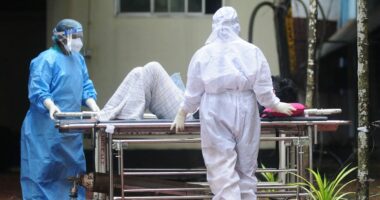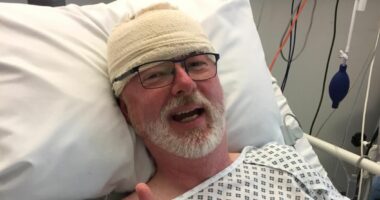Share this @internewscast.com
Before the onset of a global shutdown brought about by Covid, Colleen was a healthy USO volunteer with an operatic singing voice based in Guam.
One day, she was participating in an event when she began to feel weak and short of breath, forcing her to leave early.
Beginning around the onset of the pandemic and continuing through its first year, she started experiencing what she described as ‘crime scene periods’, with severe bleeding that would soak through multiple pads and tampons within just 30 minutes of use.
In search of answers, she traveled to the United States to consult with a doctor covered by her insurance. Colleen conveyed her experiences of excessive bleeding, extreme fatigue, and shortness of breath.
Her physician attributed these symptoms to perimenopause, a phase before menopause when the body’s production of the hormones estrogen and progesterone, which regulate menstruation and pregnancy, becomes inconsistent. This hormonal change can lead to a variety of physical and emotional signs, including tiredness, anxiety, and mental fogginess.
In 2021, she relocated to Germany with her husband, and shortly after, she was involved in a car accident. Although she was unharmed, medical staff at the hospital discovered an unusual mass in her abdomen during an X-ray, prompting them to refer her to an obstetrician-gynecologist (OB-GYN).
The OB-GYN conducted an ultrasound, identified the mass in her uterine lining, and decided to perform a procedure to extract tissue from inside the uterus for disease testing.
The results confirmed that the mass was cancerous. Initial assessments suggested that the cancer was in its early stages. However, in the following months, as the cancer metastasized to her bones and a lung, she was diagnosed with stage four endometrial cancer in 2022.
Despite the initial cancer diagnosis, her doctor was optimistic about her endometrial cancer, scheduling Colleen for a full hysterectomy that would remove her uterus and cervix, hoping to halt any spread.

Alongside her roles as an opera singer and a wife, Colleen explained that cancer, which has damaged her vocal chords has now also become a part of her identity
‘Nobody ever wants to hear the word “cancer” of any kind,’ Colleen said on The Patient Story.
Colleen said her doctor told her: ‘There’s no reason for you to have a lot of worries right now, even though I’m telling you cancer.’
She added: ‘Generally, I felt okay. I wasn’t hurting, didn’t have a lot of pain. I did not know anything about endometrial cancer.’
When caught early before it has spread from the uterus, endometrial cancer has a survival rate of about 90 percent.
By the time a patient like Colleen has reached stage four, though, that survival rate plummets to about 18 percent.
Endometrial cancer is the fourth most common cancer for women in the US, with about 69,000 annual diagnoses and 14,000 deaths.
While rates of deaths over time due to endometrial cancer have remained stagnant, cases have ticked up in recent years, from 26.9 cases per 100,000 women to 28.8 per 100,000 women in 2022, the most recent year for which trendline tracking is available.
Doctors began Colleen’s month-long radiation treatment regimen in mid-2022, followed by three sessions of internal radiation, where the radiation is placed inside the body.

After discovering the cancer had metastasized from her uterus to her lung, she described the visible damage to her vocal cords from repeated intubation. The severe swelling was a result of the multiple procedures required for her leg surgery and bronchoscopies

Before she got sick, Colleen was a classically trained professional singer. Years of intubations and surgeries left her vocal chords swollen and her voice raspy and pained
In the fall of 2022, she began five months of chemotherapy and in March 2023, it was determined that she had no evidence of cancer in her body.
However, in December 2023, she broke her leg. Doctors told her that the cancer had spread to her femur, leaving it brittle and easily breakable.
‘That was a big emotional time,’ she said.
‘Any time you hear bone metastasis, it’s not good news. Cancer is impossible to get out of the bone practically… and pretty much all you can do is slow it down.
‘There were a lot of tears, a lot of contemplations of death.’
She later learned that the cancer had also spread to one of her lungs.
‘It was freaky. You can see the damage on my vocal cords.
‘They were extremely, extremely swollen from having tubes stuck down so many times with the surgery for my leg, a failed bronchoscopy [a procedure that allows a doctor to examine the airways and lungs], a successful bronchoscopy, and then the surgery [to repair my leg].’
Colleen finished her most recent chemotherapy round in July 2025, and a sample of the cancer in her leg has been sent to a lab to explore personalized treatment options based on her cancer’s genetic markers.
But she worries her treatment options will be limited.

After completing her latest round of chemotherapy in July, a biopsy from the cancer in her leg was sent for genetic testing to identify potential targeted therapies. Despite this, Colleen remains concerned that her future treatment options may be limited

Hearing the term ‘palliative care’ for the first time was frightening for Colleen, shown with her husband. However, she came to understand that since her cancer spread to her bones, her ongoing treatment has had a palliative goal to improve her quality of life
She said: ‘Here in the area that I am in, it’s so rural that I don’t think there’s a lot of clinical trials that happen here.
‘And they have used the term palliative care, which freaked me out the first time. Because I have metastasis in my bone, they’re considering everything that they’re doing palliative care for a year and a half.’
The cancer has become a new identity of hers, she said, in addition to being a singer and a wife. She hopes to maintain her independence as much as possible, though she can no longer drive much because of the cancer in her right leg.
She said: ‘A really big thing for me has been a chance to reflect on it. Whatever you believe in, hang on to it. If it’s a religious belief, if it’s a way to lead your life, hang on to those things. Keep looking up, whatever your diagnosis is.’














